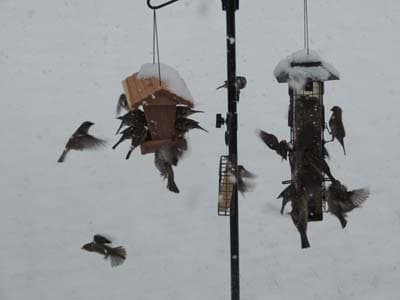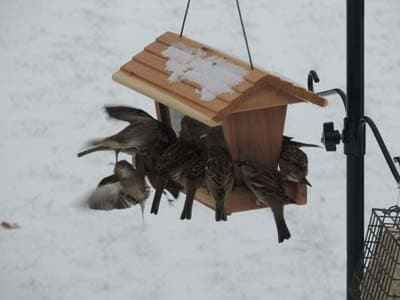
If you see one house sparrow, you’ll probably see dozens. While you may think of them as all house sparrows, chances are there are several species. As a matter of fact, there are 12 subspecies of sparrows. These birds are now be found all around the world.
House Sparrows, also called English Sparrows, were introduced into the U.S. in the 1850s. It was believed that these songbirds were big insect eaters and could help to control insect populations. In reality, sparrows’ diet is less than 10 percent insects. The majority of their insect consumption is to feed their hatchlings.
Did you know? Sparrows are not native to North America? This may be hard to believe because sparrows are one of the most populous birds in North America!
Chances are you’ve seen many of these popular and common birds. These small, brown and gray birds are about 6 inches long. They are year-round residents and do not migrate. They are social birds, often seen in large flocks.
They are year-round residents, who populate bird feeders in big numbers.
Mating pairs often produce two, and sometimes three, broods per year. Their eggs hatch in 11 days. Hatchlings spend 14 days in the nest. While they are not territorial birds, they are aggressive in protecting their nest while eggs and later baby chicks are in it. It is important to note that cats are major predators of juvenile birds.
Did you know? Normally, they live to about five years in the wild. But, sparrows can live up to 23 years!

Sparrows eat grains, seeds, moths, insects, and nectar. They are also fond of pieces of bread.
Looking to attract them to your bird feeder? It’s a cinch, as they like millet, which is common in birdseed mixtures. See Bird Seed Feeding Chart.
Sparrows live in a wide range of areas, including fields, open lands, urban, and suburban areas. They avoid woods and desert regions. Your backyard is the perfect place for them.
Here is more information on how to attract birds to your backyard:

©1999-2024 GardenersNet.Com, All Rights Reserved